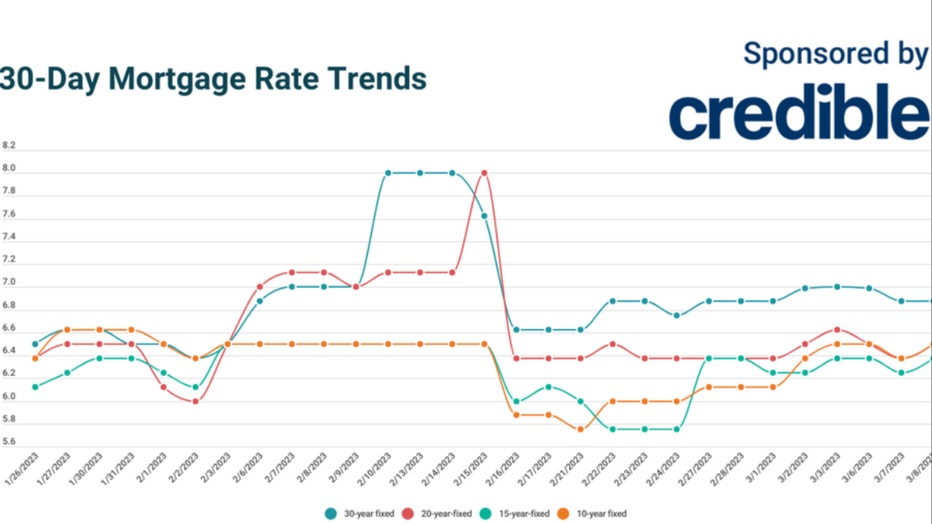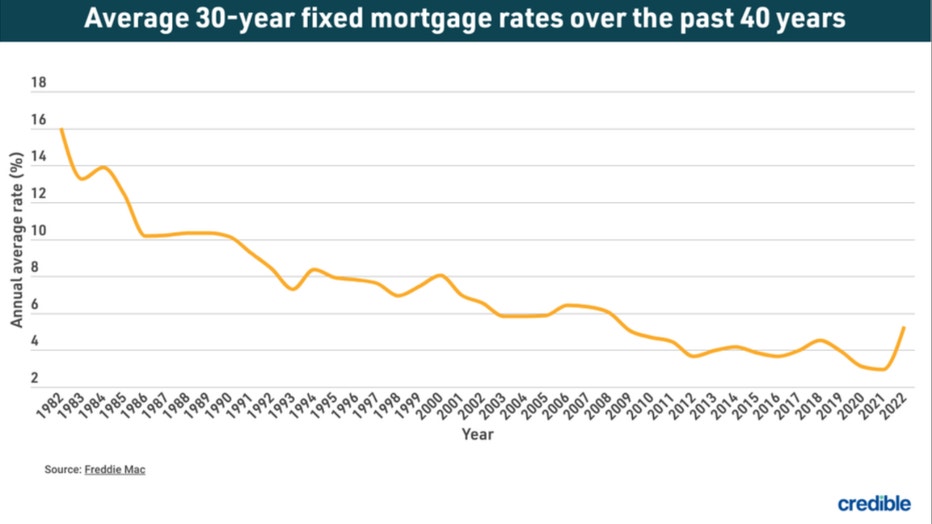Today's 30-year mortgage rates hold steady at 5-day low | March 8, 2023
Our goal here at Credible Operations, Inc., NMLS Number 1681276, referred to as "Credible" below, is to give you the tools and confidence you need to improve your finances. Although we do promote products from our partner lenders, all opinions are our own.

Check out the mortgage rates for March 8, 2023, which are largely up from yesterday. (Credible)
Based on data compiled by Credible, mortgage rates for home purchases have risen for three key terms and remained unchanged for one term since yesterday.
- 30-year fixed mortgage rates: 6.875%, unchanged
- 20-year fixed mortgage rates: 6.500%, up from 6.375%, +0.125
- 15-year fixed mortgage rates: 6.375%, up from 6.250%, +0.125
- 10-year fixed mortgage rates: 6.500%, up from 6.375%, +0.125
Rates last updated on March 8, 2023. These rates are based on the assumptions shown here. Actual rates may vary. Credible, a personal finance marketplace, has 5,000+ Trustpilot reviews with an average star rating of 4.7 (out of a possible 5.0).
What this means: Mortgage rates edged up for three key terms today, bringing 20-year rates up to 6.5%. Homebuyers who want a shorter repayment term and are comfortable with a higher monthly payment may want to consider 15-year mortgage rates. Rates for this term are half a percentage point lower than 30-year rates and offer the opportunity to be mortgage-free sooner.
To find great mortgage rates, start by using Credible’s secured website, which can show you current mortgage rates from multiple lenders without affecting your credit score. You can also use Credible’s mortgage calculator to estimate your monthly mortgage payments.
Based on data compiled by Credible, mortgage refinance rates have risen across all terms since yesterday.
- 30-year fixed-rate refinance: 6.500%, up from 6.375%, +0.125
- 20-year fixed-rate refinance: 6.250%, up from 6.000%, +0.250
- 15-year fixed-rate refinance: 6.000%, up from 5.875%, +0.125
- 10-year fixed-rate refinance: 6.250%, up from 6.125%, +0.125
Rates last updated on March 8, 2023. These rates are based on the assumptions shown here. Actual rates may vary. With 5,000 reviews, Credible maintains an "excellent" Trustpilot score.
What this means: Mortgage refinance rates rose across all repayment terms today, with 20-year rates surging a quarter of a percentage point. Still, homeowners looking to refinance into a longer repayment term may want to consider 20-year rates: At 6.25%, this longer repayment term offers the combination of a relatively low interest rate and manageable monthly payments.
How mortgage rates have changed over time
Today’s mortgage interest rates are well below the highest annual average rate recorded by Freddie Mac — 16.63% in 1981. A year before the COVID-19 pandemic upended economies across the world, the average interest rate for a 30-year fixed-rate mortgage for 2019 was 3.94%. The average rate for 2021 was 2.96%, the lowest annual average in 30 years.
The historic drop in interest rates means homeowners who have mortgages from 2019 and older could potentially realize significant interest savings by refinancing with one of today’s lower interest rates. When considering a mortgage refinance or purchase, it’s important to take into account closing costs such as appraisal, application, origination and attorney’s fees. These factors, in addition to the interest rate and loan amount, all contribute to the cost of a mortgage.

How Credible mortgage rates are calculated
Changing economic conditions, central bank policy decisions, investor sentiment and other factors influence the movement of mortgage rates. Credible average mortgage rates and mortgage refinance rates reported in this article are calculated based on information provided by partner lenders who pay compensation to Credible.
The rates assume a borrower has a 740 credit score and is borrowing a conventional loan for a single-family home that will be their primary residence. The rates also assume no (or very low) discount points and a down payment of 20%.
Credible mortgage rates reported here will only give you an idea of current average rates. The rate you actually receive can vary based on a number of factors.
Factors that influence mortgage rates (and are in your control)
Many factors affect what mortgage interest rate you can qualify for, and some of them are within your control. Improving these factors could help you qualify for a lower interest rate.
- Credit score — Generally, the lowest interest rates go to borrowers with the highest credit scores.
- Debt-to-income ratio — DTI is a percentage that compares your total debts with your income. To calculate DTI, divide your monthly gross income by the total of all your monthly minimum debt payments. Generally, lenders prefer a DTI of 35% or less.
- Down payment amount — Generally, lenders (and many sellers) look favorably on a higher down payment amount. If you put down less than 20% of the home’s purchase price, many lenders will require you to pay for private mortgage insurance, which protects the lender (not you) if you fail to repay the mortgage.
- Home location/price — Interest rates can vary depending on what state you live in and where in the state you’re buying. Likewise, if you need to borrow a lot more than average (a jumbo loan) or very little, you may get a higher interest rate.
- Repayment term — The lowest rates typically come with 10- or 15-year terms, while 30-year terms usually have the highest interest rates.
If you’re trying to find the right mortgage rate, consider using Credible. You can use Credible's free online tool to easily compare multiple lenders and see prequalified rates in just a few minutes.
Have a finance-related question, but don't know who to ask? Email The Credible Money Expert at moneyexpert@credible.com and your question might be answered by Credible in our Money Expert column.

